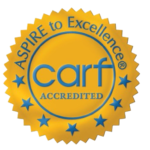Our Substance Use Disorder program offers a range of intensive levels of care to meet your unique needs on the path to recovery, with outpatient, intensive outpatient, and partial hospitalization options available.
Our SUD program incorporates three phases of treatment:
- OP (Standard)
- IOP - Intensive Outpatient Program
- PHP - Partial Hospitalization Program
OP (Standard)
IOP - Intensive Outpatient Program
IOP is one of several kinds of outpatient treatment available for recovering addicts. IOP provides patients with medical and psychological help but with minimal time commitment that allows patients to return to their normal lives such as working or caring for children.
In this program, patients only need to go to rehab or a hospital of their choice for treatment sessions, such as counseling, therapy, relapse prevention skills, and any additional services provided that the patient might be recommended to or choose to be a part of.
Intensive outpatient requires only a few, short visits a week, usually nine hours a week which are divided into four sessions. The number of sessions and hours are adaptable, as they are decided based on the diagnosis of the patient and will change as the patient improves and progresses. However, because the treatment is not continuous like it is in the inpatient program, IOP tends to take longer than inpatient treatment to be completed. Nonetheless, this in no way alters the effectiveness of the program, and there have been multiple studies proving that they are equally successful when correctly prescribed and followed.
How Does IOP Treatment Work?
Apart from individual therapy and counseling, IOP treatment is also comprised of other methods to ensure full recovery from addiction. Group activities such as group sessions can be of great help as a former addict gets support from people going through the same changes as them. This would help prevent feelings of loneliness and isolation and can also help a patient better understand themselves and their process through other people’s advice, experiences, and insights.
IOP treatment is recommended for people that have gone through the acute stage of withdrawal and do not require round-the-clock monitoring. It is also recommended for those that do not meet the diagnostic criteria for inpatient treatment and only suffer from moderate to mild addiction.
Who is IOP Best For?
This program is the preferred choice among those who want to start getting back to their usual routine since patients can stay in their own homes and would have more free hours in their day. However, it is important to be realistic about your medical and psychological needs and just how much freedom you can handle. While you may be eager to be “done” with rehab, if you do not feel confident that you have a handle on your addiction, it would be best to enroll in a higher level of care such as PHP.
IOP is not recommended for those who:
- Would be returning to an environment that would trigger cravings
- Would be exposed to situations or people that might encourage substance abuse
- Have difficulty arranging transportation to go back to the facilities for sessions
- Rehabilitation begins with daily sessions that last 2.5 to 3 hours each. These sessions include group therapy and education. We gradually taper the number of outpatient treatment sessions from four to three times a week as patients stabilize. Patients also participate in individual treatment.
PHP - Partial Hospitalization Program
This type of addiction treatment program is more intensive than IOP (intensive outpatient) but less so than full inpatient or residential rehab.
Compared to IOP, partial hospitalization requires more visits and sessions per week. This commitment is comparable to that of a residential recovery program, but unlike tradition rehab, in a PHP program the patient does not reside onsite at the facility during their treatment. They could choose their own housing accommodations.

Who Is PHP Best For?
While you can go through detox with an intensive outpatient program, PHP gives you greater access to medical staff which allows for better monitoring of your condition. A partial hospitalization program is an ideal choice for those who:
- Completed residential treatment but still have a higher chance of relapsing
- Faced severe episodes of addiction and/or overdose and have difficulty managing cravings
- Are still undergoing withdrawal symptoms and may need further detoxification services
- Even though OP, IOP and PHP are considered outpatient services, some of our clients do not have the means of obtain and sustaining independent living, employment, etc. In such cases, we provide supportive housing to help transitioned the client to independent living while participating in treatment.
How Does PHP Treatment Work?
PHP typically requires an average of 5 visits a week. These visits can range from 4 to 8 hours long depending on the needs of the patient.
PHP can be paired with other activities besides medical and psychiatric attention to better guarantee that the program will be successful, which is in fact highly recommended. As patients seem to be at a vulnerable stage of their transition, every option available to help improve mental and even physical health should be considered, especially ones that go beyond therapy sessions.
What Are the Benefits of PHP?
Each body processes substance abuse in different ways, and many factors dictate which kind of treatment is best, such as level of addiction, family history, other psychiatric conditions, lifestyle, and much more. Rushing through addiction treatment faster doesn’t mean you’ll recover sooner. Quite the contrary as it can reduce your treatment’s effectiveness.
Partial hospitalization is the perfect next step for anyone who has just left rehab or residential treatment but doesn’t feel “stable” yet. As an intermediary between residential and outpatient treatment, patients still have a significant amount of support from the facility but can now access the outside world again. PHP can help patients better adjust to the transition back to their usual routine.
Further, too much freedom too soon can be detrimental to a recovering addict. Going straight from inpatient treatment straight to outpatient can put them at greater risk of fall back into old habits.
The time commitment of PHP provides much-needed structure which plays an important role in reducing the likelihood of relapse.

